Updates on travels, adventures and news from Jess McGlothlin Media.
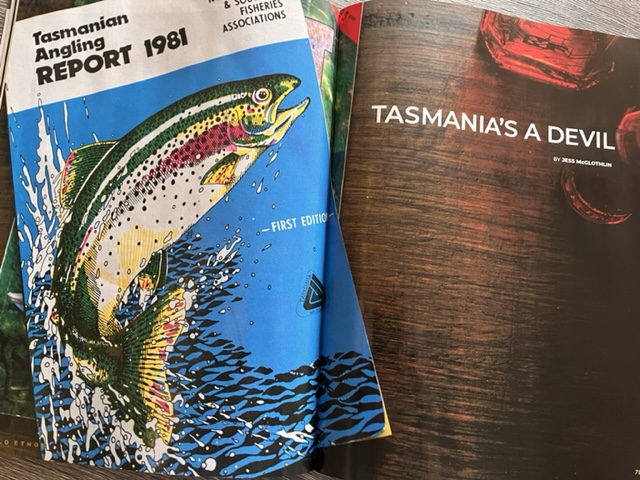
Really chuffed to see this piece in the premiere volume of The Field Ethos Journal. I’ve been writing short, online pieces for the FE team and jumped at the chance to pen something longer for their first print issue. And what better to write about than surfing brown trout, snakes alongside awesome trout streams, and some of the coolest fishing-industry folks I’ve come across? Tasmania seems tailor-made for storytelling, and I’m keen to get back one of these days and keep exploring.
Thanks to the FE team for this ten-page feature, including a few gorgeous spreads.
Over the past few years, I’ve received a volley of emails from prospective photographers and writers, asking a variety of “how do I?” questions. I’m always happy to help, and love to see people taking the leap into the professional creative world. To that end I’ve penned a few articles and blog posts about in the past. This one, “So You Want to Be a Professional Fishing Photographer?” went from a casual late-night blog post to a requested magazine article in the blink of an eye.
Thanks to the advent of the internet and the burgeoning social media realm, we’re in a world of content generation. All those articles, listicles, and funny tidbits you’re reading? Someone, somewhere, wrote them. Quite possibly in their sweatpants on the couch. Or barricaded in a corner of the local coffee shop consuming one too many lattes.
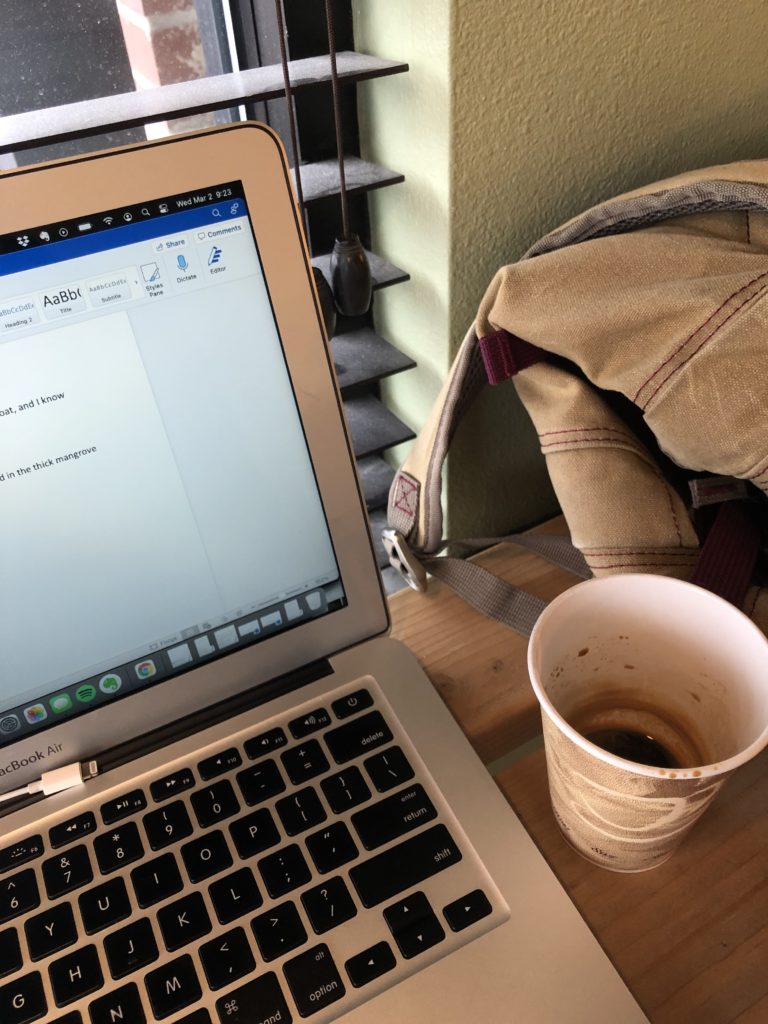 Contrary to popular belief, writing isn’t always sexy. It’s not usually this moment of divine inspiration; the heated all-night writing sessions that Hollywood would have us believe. Oh, it happens, sure. I penned one of my favorite pieces in the back of a Mi-8 helicopter trundling over the Russian tundra years ago.
Contrary to popular belief, writing isn’t always sexy. It’s not usually this moment of divine inspiration; the heated all-night writing sessions that Hollywood would have us believe. Oh, it happens, sure. I penned one of my favorite pieces in the back of a Mi-8 helicopter trundling over the Russian tundra years ago.
But the reality of most writing is remarkably unsexy. It’s grind-it-out work done to meet a deadline. Work done not in a perfectly-lit coffeeshop with rain falling softly outside; it’s late-night shifts at the desk and waking up in the middle of the night thinking I need to rephrase that one line. It’s not being able to let your brain rest until you get that line on paper, and then fiddling with it for two days when it won’t leave your conscious.
Sure, sometimes your fingers will start to tap, your mind race, and you’ve got to pen something NOW. When things flow… an hour disappears and suddenly you’ve got 1,500 words — good words — on what was a blank piece of paper.
But for the rest of the time, here are a few tips and tricks that have come hard-earned over the years.
I’m notorious for just starting to write random things on a paper. Ever since I was in grade school, it’s been a way to distract myself, to let my brain process and think. I literally have shelves of notebooks filled with writing that will never see the light of day. If we’re ever in a meeting and you see me writing, I’m not ignoring you. I’m processing the project. It could be a to-do list, it could be the beginning of a historical essay. The lure of filling blank paper with words is just too tempting, and my brain’s working as those characters appear.
So, when you find yourself staring at the blank page, just get something on paper. Line out your workout for later in the evening. Write three sentences about your last trip — what you saw, felt, smelled. Pen a poem. Last week I was stuck on an advertising campaign for a client; I picked up my pen and paper and transcribed the Russian alphabet and basic words. Next thing I knew, my brain had churned over the campaign and I was ready to get it on paper. Just fill the page… I don’t care if it’s garbage or not.
This is one of my favorite content writing tricks. Especially if it’s a topic that requires research, I’ll do my homework and then organize my notes into a basic outline. From there, it’s far easier to create a coherent article. This builds off the point above… you’re just getting something on paper, and an outline makes a big project seem a little more “biteable.”
Sometimes you need to physically move. Leve the computer, abandon the notebook, and go for a walk. If you’re in an office, go get coffee. Squeeze in a workout if you can. In my days at Orvis headquarters, I’d go throw dries as brook trout in a nearby stream. This winter, the pool and the rowing machine are my go-to for mulling over new projects. Physically moving your body puts you in a different brain space, allowing your mind to subconsciously mull over creative projects while your body is occupied with something else. Keep a note-taking device nearby… I’ve definitely been that girl in the gym madly making notes on my phone as an idea crystalizes.
Good music helps. Coffee also helps. Not a coffee drinker? Pick your poison… tea, water, kombucha, whatever. Fuel up and get those words on paper. Stream your music so you’re not constantly having to flick through songs and interrupt your creative flow. My happy space this week? Too much black coffee, a big jug of water and the Atomic Blonde soundtrack on Spotify. Next week the music selection could be Mancini. Who knows.
As cool as it sounds to say writing is truly divine inspiration, it’s not that sexy. Writing is a habit, and like all habits, it needs to be nurtured. Write often. Write a variety of content. Stuck on the commuter train? Pen a poem. Long flight? Give yourself a prompt and write a 2,500-word short story. Tired and just not feeling it today? Too bad. Write, dammit.
Some of the hardest writing I’ve done is on international assignments. When we’re in some remote corner of the world, it’s past midnight, I only have a headlamp, my body is screaming for rest and we have a 4AM wake-up to break camp, the last thing I want to do it take detailed notes in my notebook. But when we’re exhausted our brains do funny things, and I know that by the time I get on the plane ride home and feel like I have time to write notes down, I’ll have forgotten the visceral details that make stories truly compelling. You can look back over my notebooks from years past and you’ll see notes like “f-ing tired” “fishing sucked,” “peppermint-scented air,” “too many snakes,” “nurse provided antibiotics; not sure what they are,” and “this is f-ing awesome.” (These were all literally trip notes from the past several years.) Write what you feel, even if it’s in little phrases. Those comments will jolt you back into the moment later, and you can expound and get the article written on the long plane ride home. And, years later, you’ll be glad you did.
One more tip? Always, always jot down the names of place and people when you’re on location. Have the locals look at your list to ensure you’re getting the spelling right. Note nicknames, funny local terms, whatever. You’ll forget by the time you wish you remembered.
Now go forth and write, be it from the couch, the local coffeehouse, or the far corners of the globe.
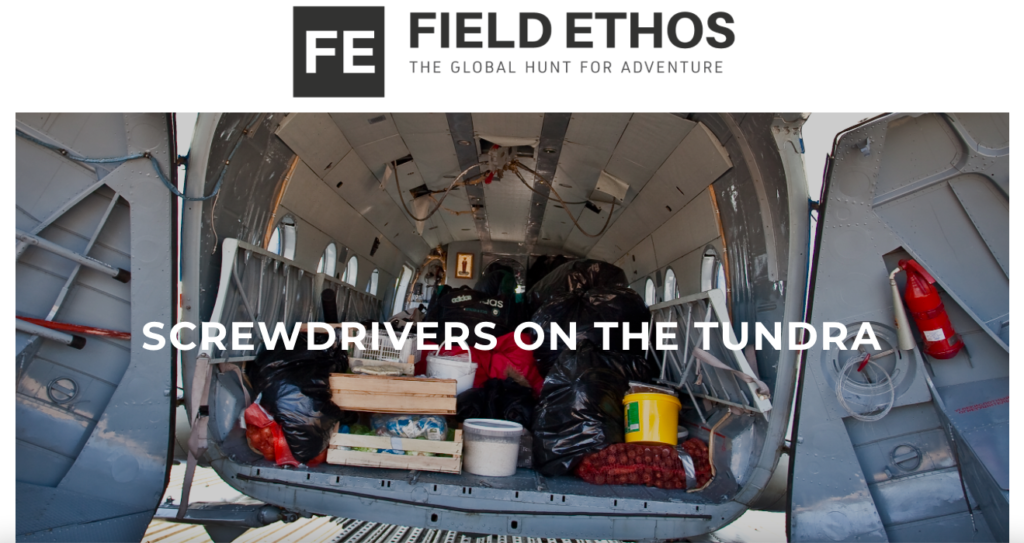 New piece on Field Ethos, talking about a bit of those behind-the-senes moments that go on in some of the world’s greatest fishing locations.
New piece on Field Ethos, talking about a bit of those behind-the-senes moments that go on in some of the world’s greatest fishing locations.
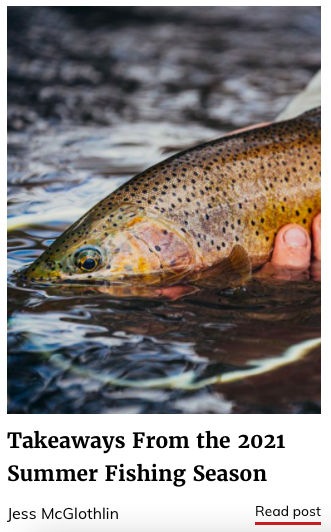 Thanks to the crew at Fulling Mill for letting me pen a few words for their blog! In “Takeaways From the 2021 Summer Fishing Season,” I took a look back at the past summer’s angling, including overcrowding, proper fish management, and high water temperatures. Enjoyed writing this piece as a look back at 2021 — lessons learned and how we can prep and plan for a better 2022 season.
Thanks to the crew at Fulling Mill for letting me pen a few words for their blog! In “Takeaways From the 2021 Summer Fishing Season,” I took a look back at the past summer’s angling, including overcrowding, proper fish management, and high water temperatures. Enjoyed writing this piece as a look back at 2021 — lessons learned and how we can prep and plan for a better 2022 season.
In true 2021 form, my fall shoot schedule is facing a volley of cancellations and rescheduling. Looking forward to hopefully hitting waters close to home with friends, getting a bit of hunting in, and just trying to make the most of it.
… Isn’t that the theme of the past few years? Just figure it out and make it work.
It was a great pleasure to sit down with @t.nolan.imagery and the team behind the B&H Photo Podcast — @jrockfoto and @allanweitz — to talk fly fishing, travel, and outdoor photography. I’ve shopped B&H since the beginning of my photographer career, and we had a very fun time recording this podcast! Toby is on top of his game, and we had a fun conversation with the B&H team about our strange little fly-fishing industry, the gear we use in the field, and more. Now we just have to get the same group back together and hit the water somewhere!
Click here to give the podcast a listen, and let me know what other topics you wish we’d touched on.
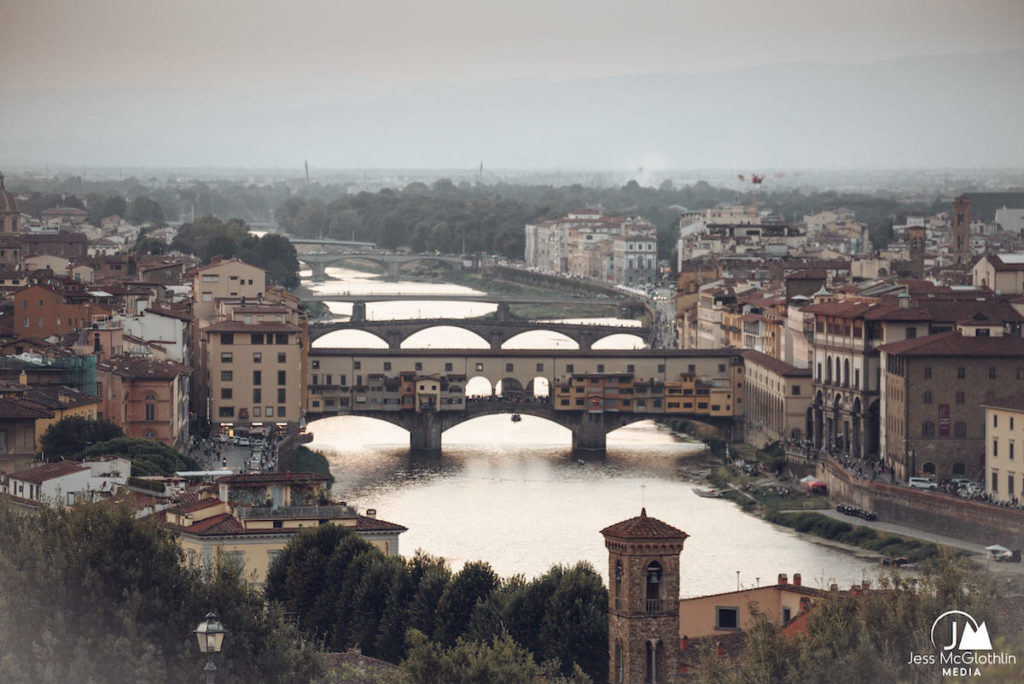
It finally happened. In early August, after 18 months of relatively steady travel, I finally caught the c-bug. And it knocked me for a bit of a loop. August was largely a blur; sleeping a lot and managing my symptoms solo in my little Missoula apartment. I lost all sense of taste and smell, and things got a little strange for a while. (As always, very grateful for family members in the medical field who could give savvy advice.)
Realistically, it’s a bit of an inevitability, and I’m very glad to now have the natural immunity. It’s amazing what our bodies can do, even if we have to help them along sometimes.
Being sick gave me a lot of time to think. In the last 18 months, I’ve spent less time working in person with teams, and more time staring at a computer screen than ever before. And it’s shitty. Don’t get me wrong — I’m very, very grateful for the ability to be able to work from anywhere, but I’m also a very firm believer in face-to-face work. There’s something about a good, old-fashioned handshake that doesn’t translate over Zoom.
It was also a good reminder to take opportunities while you have them. With a positive test in hand, I had to cancel another stint as the Guest Fishing Director at El Pescador Lodge in Belize. Another trip canceled due to the pandemic. Less human interaction, more time solo in my apartment.
In this age of dehumanization and separation, I realized it’s more important than ever to celebrate those things that are inherently human… Art. Food. Travel.
And so, as soon as I felt well enough to do so, I bought a ticket to Florence.
 Why Florence? Why Italy?
Why Florence? Why Italy?
I wanted a place totally removed from usual fishing-centric destinations. A place where I didn’t speak the language at all, where I could just wander a city for days, finding my own adventures. Some place with fresh, good food.
Somewhere that would remind me of just how transitory we are.
And so I headed to Florence. I walked miles each day down old cobblestone streets, camera in hand, shooting what I wanted to shoot, not fulfilling a client assignment. I ate gelato every day, and found a new favorite way to cook tripe. I sat under statues that have seen so many centuries pass by; so many pandemics and wars and dramas. I bought coffee and a pastry every morning and sat in the shadow of the duomo, watching the city wake up.
And one day, I booked a ticket to Rome and logged 14 miles on foot, exploring the city. Just because I could.
I’m back stateside now; actually in Austin, Texas, as I write this, for a quick client trip. I’m missing the tastes, smells… the air in Italy. But getting ready for a very busy autumn — three trips / projects coming up in October alone — and determined to make the most of whatever’s thrown my way.
Life is very strange right now. So find the little victories. And keep fighting for those things that make us human.
When the editors of FlyLife Magazine, one of my favorite publications, reached out last spring and asked me to pen a feature about how American fly fishing has changed in the past year-and-a-half, it was both an exciting and challenging proposition. Write about American fly-fishing trends and industry news for an Australian / New Zealand audience, and make it relevant? Sure. Let’s do it.
 And so I proceeded to spend a lot of time on the phone with folks I knew and trusted within the U.S. fly world. Leading off the charge? Linehan Outfitting Company, Kirk Deeter, and Wildwood Float Trips. These guys were kind enough to spend time on the phone during the busy spring months, talking about how they’ve managed through this strange time, what changes we’re seeing in regional and national demographics, the good and the bad of managing resources and overcrowding, and where our fly industry might be in the next five or so years. The team at FlyLife, as always, did a gorgeous layout, and I was thrilled to see images of some of my favorite people appear on the pages.
And so I proceeded to spend a lot of time on the phone with folks I knew and trusted within the U.S. fly world. Leading off the charge? Linehan Outfitting Company, Kirk Deeter, and Wildwood Float Trips. These guys were kind enough to spend time on the phone during the busy spring months, talking about how they’ve managed through this strange time, what changes we’re seeing in regional and national demographics, the good and the bad of managing resources and overcrowding, and where our fly industry might be in the next five or so years. The team at FlyLife, as always, did a gorgeous layout, and I was thrilled to see images of some of my favorite people appear on the pages.
Thanks to all who contributed to this piece, be it in a phone call, an image taken over the years past, or a long, fireside conversation about the ethics and politics of our industry. (You know who you are.) And thanks to the team at FlyLife for sending the assignment my way.